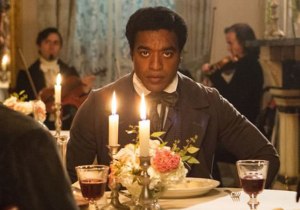I finally saw “12 Years a Slave” last weekend and I thought it was an excellent film. In fact, I thought it was brilliant. Chiwetel Ejiofor and Lupita Nyong’O should receive every award and accolade for their amazing performances. Additionally, Steve McQueen will have a good shot at receiving a number of awards for “Best Director.”
With all of that being said, there has been some criticism of the film. Now, the film is not completely perfect. There could have been a little more in the movie about Solomon Northrup’s life before being kidnapped into slavery, and there are other complaints about the film that may indeed be valid. However, one of the more enduring criticisms is not about the quality of the film, but more about “12 Years a Slave” being another film about slavery.
Often the retort to this criticism is that Jewish Americans don’t complain about how many films are about the Holocaust of Jews in Nazi Germany. In fact, another film that premiered this month is “The Book Thief,” which is another film that takes place during the Holocaust. There seem to be very few Jewish folks coming out asking “why do we need another movie about the Holocaust?” Well, you probably haven’t heard anyone ask that question. There have been a lot of movies about the Jewish Holocaust, and the Holocaust lasted for several years. There haven’t been nearly as many films about the enslavement of Africans in the Americas, even though that lasted two and a half centuries. The reasons for the differences of how Jewish people and African Americans view their respective Holocausts probably deserve a much longer and thorough thesis, but it is a very interesting contrast that I will have to save for another time.
In many ways, “12 Years a Slave” suffers from the recent success of “Django Unchained,” which was a movie that claimed to be about African American enslavement, but the only people who received any accolades for the film were the white writer/director, Quentin Tarantino, and the white supporting actors Christoph Waltz and Leonardo DiCaprio. Though it received critical acclaim, “Django” left a bad taste in the mouths of many African American filmgoers for a number of reasons, including the film’s senseless violence and its liberal use of the “N-word.”
So then the question becomes, if we are concerned about too many films about slavery, where do we go from here? Because it is not just the movies about slavery that are bothering people, it is also the movies that have Black people starring as domestics. Think about it for a second; in the last three years or so, the movies with Black main characters that have garnered so much attention have been about a maid (“The Help”), a spaghetti western posing as a movie about slavery (“Django Unchained”), and a butler in the White House (“The Butler”). However, there were several really good movies that premiered this year with Black cast members and Black filmmakers that have nothing to do with slavery or Black domestics, but have not been shown on as many theaters. Movies like “Fruitvale Station,” “Free Angela Davis and All Political Prisoners,” “An Oversimplification of Her Beauty,” and “Middle of Nowhere,” which was written, directed and co-produced by Ava DuVernay, who recently directed the eighth episode of the hit television drama, “Scandal.”
With the rise of social media and the independence that it brings with getting work to audiences, as well as providing avenues for fund-raising for small budget films, there will be many opportunities for Black filmmakers to make quality films. However, it will be up to audiences to do more than complain about there being another film about slavery or Black domestics. We will have to support those works that show the diversity of Black life from the Black writer, director or producer point of view. Until then, films about Black life will be about how others view Black life or how others are comfortable viewing Black life. That will be a disservice to the many talented Black artists out there who are producing quality work.
On another note, how no one has asked why there will be another Madea movie (“Madea’s Christmas”) is beyond me. However, I digress.


